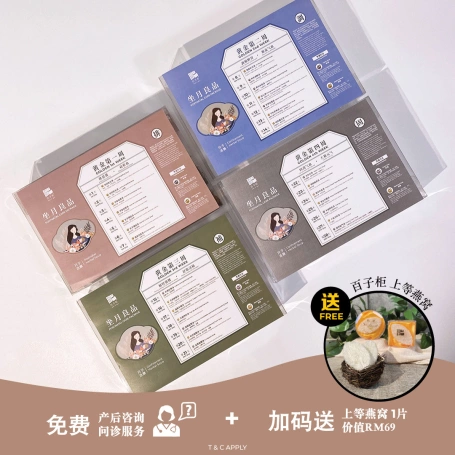Postpartum Recovery Tips I Confinement Gift for Mother

Postpartum recovery refers to the period following childbirth when a new mother’s body undergoes significant physical and emotional changes as it returns to its pre-pregnancy state. This phase is crucial for healing and adjusting to new motherhood, affecting both physical well-being and mental health.
What is the cultural significance of confinement?
Postpartum confinement, observed in various cultures, involves a period of rest and specific practices designed to support the new mother’s recovery. Traditions such as the Chinese "Zuo Yue Zi" emphasize rest, special diets, and limited physical activity to help the mother heal and bond with her baby. These practices aim to expedite recovery, enhance bonding, and reduce stress.
Why is postpartum confinement important?
Confinement practices are rooted in the belief that a structured recovery period can significantly enhance a new mother’s physical and emotional well-being. Traditional practices, such as special diets and rest, are designed to replenish the mother’s body and prevent long-term health issues. Modern adaptations include professional meal delivery services and postnatal fitness programs that align with contemporary lifestyles while preserving traditional benefits.
What are some tips for physical recovery after childbirth?
Napping When Baby Sleeps: Utilize the baby’s nap times to rest and recharge, maximizing recovery opportunities.
Creating a Comfortable Sleeping Environment: Use supportive pillows, maintain a cool room temperature, and minimize noise and light disturbances to ensure restful sleep.
Nutrient-Rich Foods: Focus on consuming foods high in vitamins and minerals, such as fruits, vegetables, lean proteins, and whole grains, to support healing and energy levels.
Hydration Tips: Drink plenty of water and herbal teas to stay hydrated, which supports milk supply and overall health.
Pelvic Floor Exercises: Strengthen pelvic muscles with Kegel exercises to aid in recovery.
Postpartum Yoga: Engage in gentle stretches and yoga to support physical recovery, reduce stress, and improve flexibility.
How should a new mother manage emotional and mental well-being?
Baby Blues vs. Postpartum Depression: Baby blues are common and temporary, whereas postpartum depression is more severe and requires professional help. Recognizing the signs and seeking support is essential.
Seeking Support: Discuss emotions with loved ones and mental health professionals to receive guidance and emotional support.
Mindfulness and Meditation: Practice mindfulness and meditation to manage stress and maintain emotional balance.
Journaling: Writing about feelings and experiences can help process emotions and provide perspective.
Family and Friends: Rely on family and friends for help and support to ease the transition into motherhood.
Support Groups: Join support groups to connect with others who understand and share similar experiences.
What are some practical tips for managing daily life during postpartum recovery?
Diaper Changing Stations: Set up convenient diaper changing stations around the house for easy access.
Feeding Supplies: Keep feeding supplies like bottles and breast pumps organized and clean.
Prioritizing Tasks: Focus on essential tasks and avoid getting overwhelmed with non-essential chores.
Delegating Responsibilities: Ask for help from family and friends to share the load and reduce stress.
Quick Beauty Rituals: Engage in simple beauty routines, such as face masks and moisturizers, to help feel refreshed.
Relaxation Techniques: Incorporate relaxation practices like reading or taking a warm bath into daily life to unwind and rejuvenate.
What foods are best for postpartum recovery?
Fruits and Vegetables: Offer essential vitamins and minerals needed for healing.
Lean Proteins: Foods like chicken, fish, and legumes support muscle repair and energy levels.
Whole Grains: Include oats, brown rice, and quinoa to provide sustained energy and support digestion.
How long should postpartum confinement last?
The duration of postpartum confinement varies by culture and personal preference, generally ranging from a few weeks to several months. This period helps the mother recover and adjust to her new role.
Where can I find the best confinement gifts for new mothers in Malaysia?
BaiZiGui: Premier Postpartum and Baby Care Products
At BaiZiGui, we are dedicated to offering a comprehensive range of postpartum and baby care products specifically designed for new mothers. Our selection includes various health products aimed at aiding postpartum recovery and enhancing physical fitness.
Our baby care products are crafted with ancient formulas combined with pure, natural Chinese medicine, ensuring gentle and effective care. These products not only support the immune system but also promote overall health and well-being for your baby.
Whether you are looking for traditional Chinese medicine solutions or modern health products that incorporate advanced technology, our carefully curated selection guarantees high quality and safety. Trust BaiZiGui for all your postpartum and baby care needs, blending time-honored practices with modern innovation.
Conclusion
Effective postpartum recovery involves adequate rest, proper nutrition, gentle exercise, and emotional support. Thoughtful gifts can greatly enhance a new mother’s recovery and ease her transition into motherhood. By understanding and addressing these needs, you can make a significant positive impact on her postpartum journey.

 Bahasa melayu
Bahasa melayu 中文
中文
























